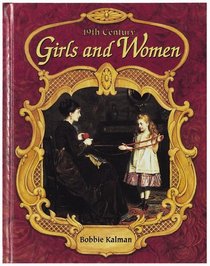Barbara R. (Crop4Fun) reviewed 19th Century Girls and Women (Historic Communities) on + 1217 more book reviews
Describes various aspects of the lives of women and girls during the nineteenth century, including their lack of educational opportunities, restrictive clothing, pastimes, courtship and marriage, and limited employment prospects.
Series: Historic Communities: A Bobbie Kalman Series
Length: 32 pages
Industry reviews
Gr 3-5 Using the two-page chapter that has become so widespread in children's nonfiction books, Kalman covers the traditional female role, limited educational opportunities, clothing, leisure time activities, courtship, marriage, childbirth, employment, and the beginnings of the women's rights movement between 1801-1900. Historical photographs, artwork and staged reproductions are in color and of fair to good quality. Two pages are devoted to "Three girls' stories," fictionalized anecdotes from a pioneer girl, an immigrant, and a slave. These are very brief, trite, and not totally successful at reminding readers that 19th-century girls could lead quite varied lives depending on their place in American society. In spite of these minor criticisms, Kalman presents a good overview of her subject in a reasonably organized, interesting, and attractive manner. A solid introduction to the topic for young readers.
Series: Historic Communities: A Bobbie Kalman Series
Length: 32 pages
Industry reviews
Gr 3-5 Using the two-page chapter that has become so widespread in children's nonfiction books, Kalman covers the traditional female role, limited educational opportunities, clothing, leisure time activities, courtship, marriage, childbirth, employment, and the beginnings of the women's rights movement between 1801-1900. Historical photographs, artwork and staged reproductions are in color and of fair to good quality. Two pages are devoted to "Three girls' stories," fictionalized anecdotes from a pioneer girl, an immigrant, and a slave. These are very brief, trite, and not totally successful at reminding readers that 19th-century girls could lead quite varied lives depending on their place in American society. In spite of these minor criticisms, Kalman presents a good overview of her subject in a reasonably organized, interesting, and attractive manner. A solid introduction to the topic for young readers.




